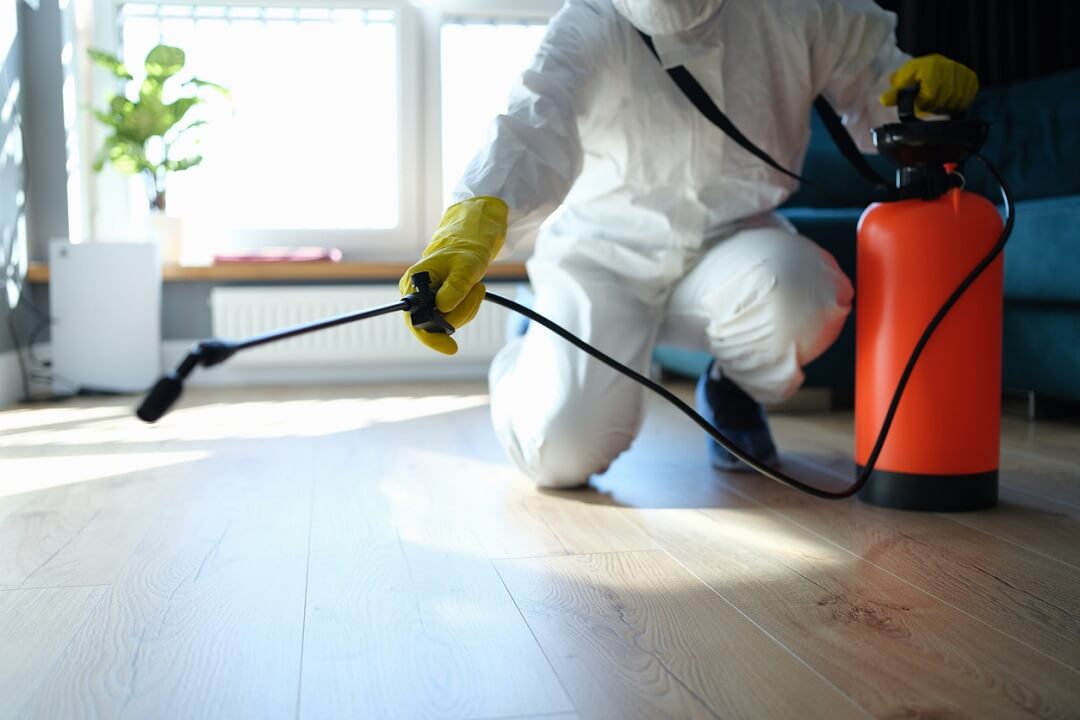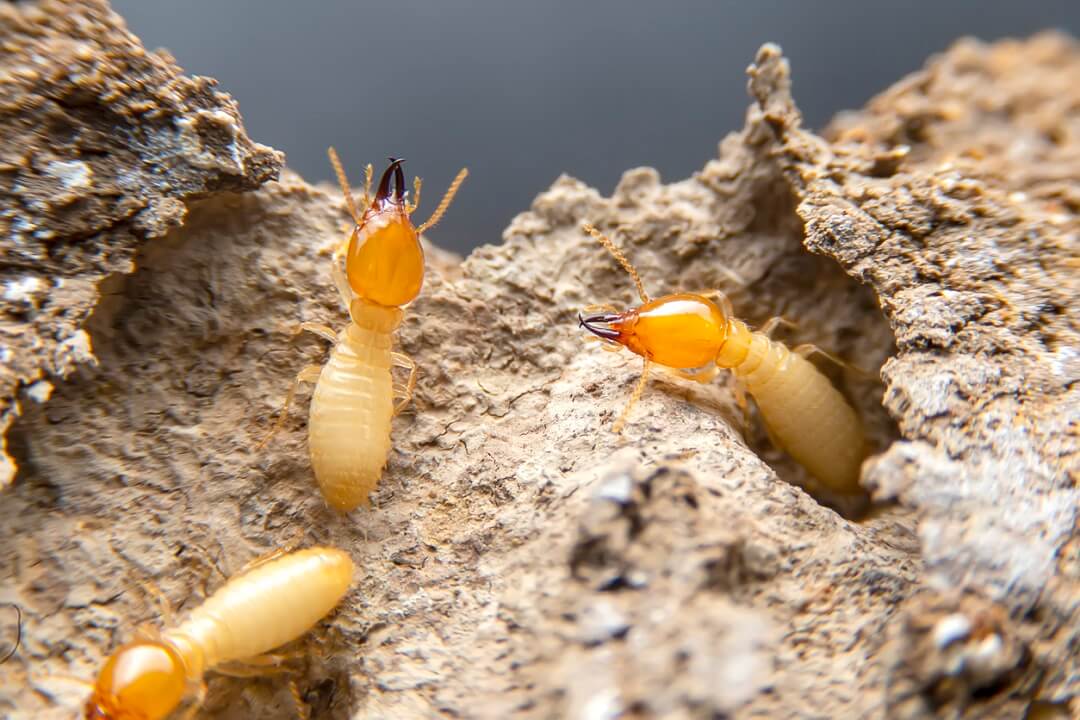No homeowner wants to experience a pest infestation. Pests like spiders, rodents, and cockroaches can invade the home and spread germs that can make you and your family sick. Other pests, like termites, do not pose a significant risk to humans directly, but these termites can cause damage to your home and put you and your family at risk.
Termites are responsible for billions of dollars in damage every year, with the average homeowner paying around $575 to repair damage caused by these notorious pests.
Here we will explore why termites are bad for your home and property and how to eliminate termite infestations. Learn the early warning signs of termites and how to prevent them from infesting your home.
Key takeaways
- Termites don’t harm humans directly, but they chew on wood and can weaken a home’s structure, making it unsafe.
- Damage from termites can lead to costly repairs. Cost depends on the extent of damage, type of termite, location, property size, and construction type.
- Termites can cause health issues like allergic reactions, asthma, risk of injury due to structural damage, and sickness from mold exposure.
- They can chew through electrical wires, increasing the fire risk and lowering a property’s value due to structural damage.
- Preventing termite infestations includes regular inspections, moisture control, removing wood debris, sealing cracks, using treated wood, and professional termite control.
Are termites dangerous?
Termites are not dangerous to humans in the sense that they do not bite, sting, or transmit diseases. However, they can cause significant damage to wooden structures and materials, including homes and buildings, furniture, and other wood-based items. This damage can weaken the structural integrity of the affected structures and compromise their safety.
6 Reasons why termites are bad
Termites feed on wood and other cellulose-based materials. While this is beneficial in nature, and termites play a pivotal role in maintaining a balanced ecosystem by breaking down wood which, in turn, provides nutrients to the soil, their presence in a home can cause significant damage.
1. Termites cause property damage.
Termites are known to cause significant property damage, particularly to wooden structures and materials. They feed on wood and other cellulose-based materials, which makes them particularly destructive to wooden structures such as homes, buildings, and furniture.
2. The damage can result in costly repairs.
Termites can cause extensive damage to wooden structures, weakening their structural integrity and compromising their safety. In some cases, termite damage can be so severe that it may require costly repairs or even complete replacement of the affected structures.
3. Factors that affect the cost of repairs.
The cost of termite repairs can vary depending on several factors, including:
- Extent of damage: The cost of repairs will depend on the extent of termite damage to the property. Minor damage can often be repaired easily and inexpensively, while more extensive damage may require costly repairs or even replacement of the affected structures.
- Type of termite: Different types of termites can cause varying levels of damage, which can affect the cost of repairs. For example, subterranean termites are often more destructive than drywood termites.
- Location: The cost of termite repairs may vary depending on the location of the property. Factors such as local building codes, labor costs, and access to materials can all affect the cost of repairs.
- Size of the property: The size of the property can also affect the cost of termite repairs. For example, larger properties may require more extensive repairs.
- Type of construction: The type of construction of the property can also affect the cost of repairs. Properties with complex designs or unique construction features may be more difficult and expensive to repair.
4. Termites can pose health risks.
While termites do not pose a direct risk to humans through bites or stings, their presence in your home can impact the health of you and your family. Some potential health risks include:
- Allergic reactions: Termite droppings, saliva, or shed skin create allergens that, for people with allergies, can cause sneezing, itching, and respiratory problems.
- Asthma: Mush like with allergies, the presence of termite allergens and the dust and debris caused by their presence can trigger asthma attacks and other respiratory problems.
- Structural damage: As termites cause structural damage, this damage can compromise the structural integrity of your home, increasing the risk of injury or accidents.
- Mold exposure: With increased termite activity comes increased moisture. This increase in moisture can contribute to the growth of mold, which can irritate the respiratory system and make you sick.
5. Electrical damage and increased fire risk from termites.
Termites not only chew through the wood within your home, but they can also chew through the protective coatings on electrical wires. This can cause them to short-circuit and, when these short circuits occur, increase the risk of a potential fire in the home. In addition, termites can also damage other electrical components, such as transformers, circuit breakers, and fuse boxes, which can increase the risk of electrical malfunctions and fire hazards.
6. Termite damage can decrease property value.
Termites can cause structural damage to a property, which can affect its overall safety and stability. The damage caused by termites can be costly to repair, which can decrease the overall value of the property. In addition, a history of termite infestations or damage may make the property less attractive to potential buyers and may make it more difficult to sell.

Controlling and preventing termite infestations
Controlling and preventing termite infestations typically involves a combination of preventative measures, regular inspections, and treatment of infestations when they occur.
Regular inspections
Regular inspections can help detect termite activity early and prevent infestations from becoming established. Inspections should be conducted at least once a year or more frequently in areas with high termite activity.
For an in-depth look at termite detection, read How to Know if You Have Termites?
Moisture control
Termites are attracted to moisture, so removing any water or dampness sources from around the property is important. This may include repairing leaky pipes, improving drainage around the property, and ensuring proper ventilation.
Remove wood debris
Termites feed on wood and other cellulose-based materials, so it is important to remove any sources of wood from around the property. This may include removing dead trees or stumps, storing firewood away from the property, and avoiding using wooden mulch around the property.
Seal cracks and crevices and provide barriers
Termites can enter into your home through the smallest of cracks and crevices, so it is important to make sure that you seal any potential entry points. Unfortunately, even with these points of entry sealed, termites can build mud tubes to bypass them. Physical barriers can be installed around the property to prevent termites from gaining access to the building. This may include installing metal mesh barriers or treated lumber barriers in the soil around the property.
Use treated wood
Treated wood can be an effective way to prevent termite infestations. Treated wood is wood that has been treated with chemicals that are toxic to termites, such as borates, copper compounds, or pyrethroids. These chemicals help to deter termites from feeding on the wood or building their nests in it. Treated wood can be used in various applications, including as a building material for structures, as a barrier around the foundation of a building, or as a termite-resistant mulch around landscaping.
Read more about treated wood and termites in this blog, Is Pressure Treated Wood Termite Resistant?
Termite treatments
If termites are detected, it is important to treat the infestation immediately in order to prevent further damage. This may involve using insecticides, baits, or professional termite control, depending on the severity of the infestation.
Professional termite control
Termite control can be complex and requires specialized knowledge and equipment. Working with a professional pest control company can help ensure that preventative measures are implemented, and infestations are treated promptly and effectively.

Frequently asked questions
Here we answer some common homeowner questions regarding termites and termite infestations.
Can termites harm humans?
As mentioned above, termites do not bite or sting and do not pose a direct threat to humans. However, their presence and the structural damage they cause can increase the risk of allergies, asthma, and injury.
When should I be worried about termites?
If you live in an area prone to termites, the best time to worry about them is well before they even enter your property. Termite prevention helps ensure that your property stays termite-free, and you don’t have to worry about potential damage. Signs that termites may have already entered your property and are causing damage can include:
- Swarming termites
- Presence of mud tubes or tunnels on exterior walls
- Termite droppings, or frass, around your foundation or areas of wood
- Hollow-sounding wood structures
Will my home insurance cover termite damage?
In general, most standard homeowner’s insurance policies do not cover termite damage or infestations. Termite damage is typically considered a maintenance issue, and insurance policies typically exclude damage that is caused by pests, including termites.
Understanding what termites can do to your home
As a homeowner, termites can be one of the most destructive pests you may have to deal with. Understanding how these pests feed and the early signs of their presence can help reduce your risk of significant damage. Working with a professional termite control specialist can help develop a preventative plan to help keep your home termite-free.
Now is the time to think about termites
When it comes to termites, it is better to think about them before they ever reach your property. At Insight Pest Management, or experts specialize in termite control and prevention and will work with you to create a prevention plan that helps you rest easy knowing that the termites are being kept at bay.
To learn more about termite prevention, schedule a free quote today.


